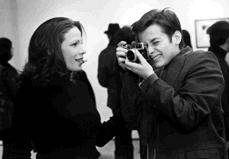The Year in Movies

| Independents' Daze
Indeed, the year was a disaster for films with aspirations beyond the generic; perhaps it was the impact of 1997's Titanic. So much for 1996, when every Academy Award for Best Film nominee was more-or-less an independent production. Or maybe it's because people don't know how to make art films anymore. Despite, or because of, its earnestness, Beloved was wrongheaded from the start, from the village idiot acting of Thandie Newton —who made Winfrey's perfunctory performance seem nuanced— to Demme's flourishes of Sam Raimi-like special effects (Raimi, paradoxically, later made the solid Demme-ish thriller A Simple Plan).
Not that there weren't any ambitious films being made; there was just no one interested in seeing them. You wouldn't know it, but there was a renaissance of women's cinema in 1998. Some impressive quick-to-video features were Jill Sprecher's sparkling Clockwatchers, Lisa Chodolenko's lofty High Art, Lisa Skoog's earnest Whatever, and Tamara Jenkins' wise and hilarious Slums of Beverly Hills. Instead, the ostensibly feminist films that garnered attention were The Opposite of Sex, featuring the smug Christina Ricci (the Monica Lewinsky of independent cinema); the patriarchal pap Sliding Doors, with the porcelain Gwyneth Paltrow; and Shekhar Kapur's bombastic period bodice-ripper Elizabeth. Though these films claimed to espouse feminist principles, their bottom line was essentially misogynistic. Perhaps the only independent-minded film empowering women was the overrated Truman Show clone Pleasantville, allowing Joan Allen to have an orgasm and incinerate a tree. As for the mainstream, what passed for a "woman's movie" sentenced the younger established actresses (Renée Zellweger, Julia Roberts) to submission and child rearing, and the older established actresses (Meryl Streep, Susan Sarandon) to terminal cancer — as in One True Thing and Stepmom. There's Something About Carrey |


